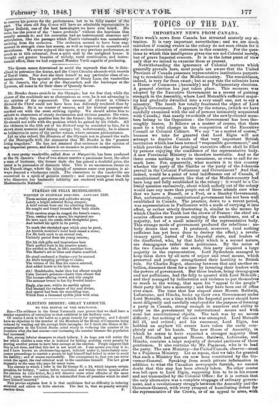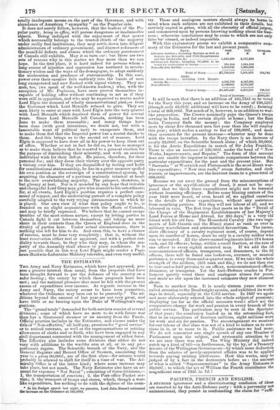TOPICS OF THE DAY.
IMPORTANT NEWS FROM CANADA.
Tins week's news from Canada Las attracted scarcely any at-. tention. It is very important nevertheless ; and we are much mistaken if coming events in the colony do not soon obtain for it the serious attention of statesmen in this country. For the ques- tions to which this intelligence gives rise are not Colonial merely, but of grave Imperial concern.- It is in the latter point of view only that we intend to examine them at present. Notwithstanding the ignorance of Colonial matters which generally prevails here, most people are aware that the United Province of Canada possesses representative institutions purport- ing. to resemble those of the Mother-country. The resemblance, indeed, is very far from exact ; but at any rate the colonists have a House of Commons (Assembly) and Parliamentary electiops; A general election has just taken place. This measure was adopted by the Executive Government as a means of gaining, strength in the Assembly, where Lord Metcalfe's sufficient major- ity, had gradually dwindled into a very small one not to say a minority. The result has totally frustrated the object of Lord. Elgin's Government. It appears by the returns, (which we have carefully examined with the aid of persons intimately acquainted with Canada,) that nearly two-thirds of the newly-elected mem, bars belong to the Opposition : the Government has been tho- roughly beaten. It follows .as a matter of course, that there must be a total change in the composition of the Executive Council or Colonial Cabinet. We say " as a matter of course," because we take for granted that Lord Elgin will not attempt to deprive Canada of that very important British institution which has been termed " responsible government," and which provides that the principal executive offices shall be filled by persons enjoying the confidence of the representative body. A new Provincial Ministry is therefore inevitable. And so far there seems nothing to excite uneasiness, or even to call for re-. mark here. For, apparently, what matters it to this country whether the party of the Smiths or the party of the Johnsoas prevail in the Colonial Parliament and Government? And that, indeed, would be a point of total indifference out of Canada, if constitutional government like that of the Mother-country had been long and fully established in the, colony : it would be a Co-: tibial question exclusively, about which nobody out of the colony would care any more than people out of these islands care whe- ther we have a Russell, or a Peel, or a Stanley Government. But, unfortunately, constitutional government has not been well established in Canada. The practice, down to a recent period, was representation in Parliament with a mode of carrying it into effect, or rather utterly frustrating it, similar to the means by which Charles the Tenth lost the crown of France : the chief ex- ecutive officers were persons enjoying the confidence, not of a majority, but of a small minority of the representative body. This strange mode of government produced the rebellions : no- body denies that now. It produced, moreover" (and nothing sufficient has yet been done to destroy the effect,) a revolu- tionary spirit, hatred of the. Imperial state, and leaders of the disaffected, who, by that habit which is a second nature, are demagogues rather than politicians. By the union of the two Canadas into one state, this party acquired a large majority in the representation. Lord .Sydenham managed to keep them down by all sorts of unjust and cruel means, which preserved and perhaps strengthened their hostility to British rule. Sir Charles Begot, choosing between that and another re- bellion, disarmed them for a time by investing their leaders with the powers of government. But those leaders, being demagogue& and not politicians, had the folly to quarrel with Lord Metcalfe ; and they managed by indiscretion and violence to put themselves so much in the wrong, that upon his " appeal to the people " their party fell into a minority ; and they have been out of office ever since. The time that has elapsed since Messrs. Baldwin, Lafontaine, and Hincks, broke up their own Government under Lord Metcalfe, was a time which the Imperial power should have most diligently and carefully employed for the purpose of forming a party in Canada, strong enough in numbers and ability to carry on the government by constitutional means and with none but constitutional objects. The task was by no means difficult ; but nothing of the sort was attempted. Lord Metcalfe fell ill, and retired ; and his successor, Lord Elgin, has bobbled on anyhow till events have taken the cards com- pletely out of his hands. The new House of Assembly, in which he seems to have expected a stronger majority than Lord Metcalfe had against Messrs. Baldwin, Lafontaine, and Hincks, contains a large majority of devoted partisans of those gentlemen. It also contains the Mr. Papineau, who is to lead the party. The new Ministry—for United Canada, observe—mud be a Papineau Ministry. Let us repeat, that we take for granted that such a Ministry has ere now been constituted by the Go- vernor-General. Speaking from much private information in addition to what the Canadian newspapers furnish, we cannot doubt that this step has been already taken. No other course was left open to Lord Elgin, supposing him to be in his senses and not trammelled by the Colonial Office : for it is certain that the only alternative was a complete stoppage of ordinary govern- ment, and a revolutionary struggle between the Assembly and the Governor-General, with every prospect of humiliating defeat for the representative of the Crown, or of an appeal to arms, with
totally inadequate means on the part of the Governor, and with abundance of American " sympathy" on the Popular side.
It does not surely follow, however, that the leaders of the Po- pular party, being in office, will pursue dangerous or inadmissible objects. Being indulged with the enjoyment of that power which necessarily belongs to the trusted chiefs of the majority under really free institutions, they may settle down into diligent administrators of ordinary government, and discreet reformers of the manifold defects and abuses which the ordinary government of Canada still exhibits. May it so turn out : but there are two sets of reasons why in this matter we fear more than we can hope. In the first place, it is hard indeed for persons whom a long course of injustice and oppression has nurtured in revolu- tionary wishes and the ways of the demagogue, to adopt suddenly the moderation and prudence of statesmanship. In this case, power over their enemies falls suddenly into the bands of men long exasperated and now flushed with signal victory. They are men, too, (we speak of the well-known leaders,) who, with the exception of Mr. Papineau, have once prove themselves in- capable of holding office without continuing to act as if they were still in opposition, and who may be expected to revive under Lord Elgin the demand of wholly unconstitutional pledges from the Governor which Lord Metcalfe refused to give. They are men likely to enter at once with Lord Elgin into the very quarrel with Lord Metcalfe which deprived them of power for several years. Since Lord Metcalfe left Canada, nothing has been done to make them reasonable ; and many things have been done (with good intentions, we doubt uot, but with a lamentable want of political tact) to exasperate them, and to make them feel that the Imperial power has a rooted dislike to them. And this brings us to the second set of reasons. Lord Elgin is supposed to have done all in his power to keep them out of office. Whether or not in fact he did so, he has so managed as to make them believe that he resorted to a general election for the purpose of diminishing their minority, and with an anxious individual wish for their defeat. He passes, therefore, for their personal foe; and they deem their victory over the opposite party a 'victory over him. If they are disqualified by feeling and habit for constitutional statesmanship, he has in a great measure spoiled his own position as the sovereign of a constitutional system, by acquiring the character of a partisan zealously inimical at heart to the now overwhelming majority. The prospect, therefore, is but gloomy at best. Nor is it mended by any hope that irritable and changeful Lord Grey may give wise copnsel to his subordinate: for, at all events, Lord Elgin's position requires a perfect com- mand of temper, and the undeviating pursuit of a complete policy carefully adapted to the very trying circumstances in which he is placed. Our own view of what that policy ought to be, in founded on no slight acquaintance with the affairs of Canada, and may be briefly expressed. We believe that he cannot escape troubles of the most serious nature, except by letting parties in Canada fight it out between themselves, and taking no more share in their contests than the Queen of England does in the rivalry of parties here. Under actual circumstances, there is nothing else left for him to do. And even this, to have a chance of success, must be done very completely ; that is, without the least reservation either real or apparent, and with a perfect cor- diality towards those, be they who they may, in whom the ma- Mority of the Assembly shall choose to place confidence. It is ust possible that in this way Lord Elgin might render a Papi- nean-Baldwin-Lafontaine Ministry tolerable, and even very useful.



























 Previous page
Previous page